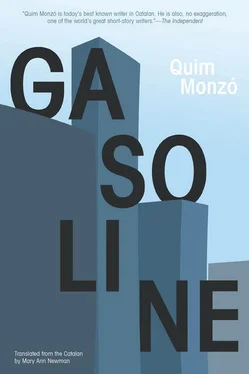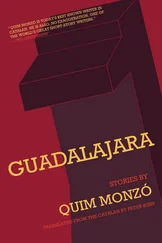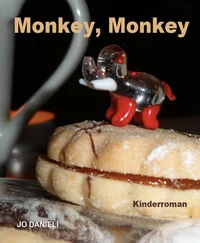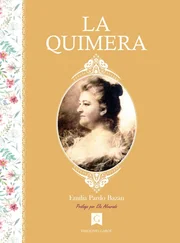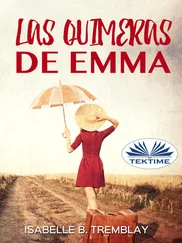Quim Monzó - Gasoline
Здесь есть возможность читать онлайн «Quim Monzó - Gasoline» весь текст электронной книги совершенно бесплатно (целиком полную версию без сокращений). В некоторых случаях можно слушать аудио, скачать через торрент в формате fb2 и присутствует краткое содержание. Год выпуска: 2010, Издательство: Open Letter, Жанр: Старинная литература, на английском языке. Описание произведения, (предисловие) а так же отзывы посетителей доступны на портале библиотеки ЛибКат.
- Название:Gasoline
- Автор:
- Издательство:Open Letter
- Жанр:
- Год:2010
- ISBN:нет данных
- Рейтинг книги:5 / 5. Голосов: 1
-
Избранное:Добавить в избранное
- Отзывы:
-
Ваша оценка:
- 100
- 1
- 2
- 3
- 4
- 5
Gasoline: краткое содержание, описание и аннотация
Предлагаем к чтению аннотацию, описание, краткое содержание или предисловие (зависит от того, что написал сам автор книги «Gasoline»). Если вы не нашли необходимую информацию о книге — напишите в комментариях, мы постараемся отыскать её.
Gasoline — читать онлайн бесплатно полную книгу (весь текст) целиком
Ниже представлен текст книги, разбитый по страницам. Система сохранения места последней прочитанной страницы, позволяет с удобством читать онлайн бесплатно книгу «Gasoline», без необходимости каждый раз заново искать на чём Вы остановились. Поставьте закладку, и сможете в любой момент перейти на страницу, на которой закончили чтение.
Интервал:
Закладка:
“What’s up, are you rusty?”
•
Slowly he sits in a pink armchair, and in absolutely no hurry, he tells Hildegarda that he no longer feels any passion for Helena, nor for painting, nor perhaps for anything at all. (As he tells her this he thinks, with satisfaction, that this decisive declaration of his state of mind, completely at odds with the impassivity of that day in bed, is just what Hildegarda expected to hear from his lips. He vows to himself that from this moment on he will do only what is expected of him.) What if Hildegarda takes him seriously? Will she be capable of asking him if he also feels no passion for her? If she does, he’ll slap her in the face, for. .? For what? For being banal and predictable. But she doesn’t ask. At first, this gives him some satisfaction. “Maybe we’re cut from the same cloth.” Gradually, though, he sees that this possibility doesn’t appeal to him either. He’s the one who’s ill at ease with everything. Annoyed at the possibility that she might be as detached as he, he tells her that Hug has told him about her, about their going out together and, as she can see, all of this was neither here nor there to him. He thinks, “If she gets angry now, or pissed off at my lack of sensitivity in telling her, or if she goes off on Hug for spilling the beans, then I win.” She walks over to him and asks him if he’d like to know how they did it. Then she puts her arms around him; they fall to the floor and roll around; she pulls off his pants and pulls up her skirt, stroking him and laughing. Heribert laughs, too, for a moment. He remembers how, before, the smoothness of Hildegarda’s cheek used to arouse him to the point of turning into a beast, an athlete. He touches her cheek, hoping to feel that velvety softness again, and even though he feels that velvety softness again, it doesn’t seem the same. He caresses her clitoris as if barely touching it, and she smiles, giving in to the pleasure. A short while later, though, Heribert yawns, closes his eyes, progressively decreases the friction, and falls asleep.
•
When he awakens he sees Hildegarda, dressed in black, sitting in the pink armchair he had previously occupied. She is looking at him. With severity? With indifference? As if she didn’t see him? With disparagement? With curiosity? All those questions strung together, muses Heribert, could be the lyrics to a torch song. How exactly is she looking at him?
“Shall we go out?” she says.
Heribert slowly gets dressed. Does he feel better than before? Worse? “If only I had felt a little guilty. .” he thinks, but then wonders, guilty of what? If only he could say that Hildegarda was punishing him with indifference, punishing him with contempt. .
They say goodbye outside. Hildegarda gives him an icy kiss on the lips. Heribert walks away, crossing to the alternate side of the street at every corner.
When he gets home, Helena is arriving at the same time. At the street entrance, they look at each other, each with key in hand, grinning at each other, like tacit accomplices.
“Good evening. .”
“Good evening. .”
Pleasantly, they say “after you” on the way in and “after you” at the stairs. This is the first time they have run into each other at night, each coming home separately. At the door to the apartment, the double keys are repeated and the double smiles. “We seem symmetrical.” If only symmetry could be applied to everything. . They take their coats off at the same time, one next to the other, and one next to the other they hang them on two hooks of the coat rack. They brush their teeth in neighboring sinks, symmetrically: one holds the toothbrush with the right hand, and the other with the left. They get undressed at the same time, on either side of the bed. They pick up the top sheet at the same time and get in at the some moment. Heribert wishes they would dream the same dream.
•
Helena wakes him up, hands him the telephone, and disappears into the living room. It’s Herundina. Half asleep, he answers, agrees to see her that evening, arranges the time and place, hangs up, thinks that it’s the second time Helena has heard Herundina’s voice, and goes back to sleep.
A short time later, Helena wakes him up again. She covers the mouthpiece of the telephone with her hand. It’s that young man, she says, whom Heribert is supposed to have called and hasn’t. Since Helena has called him about seeing some etchings, why doesn’t he take a moment and talk to him? He talks to him. Humbert is a painter, he wants to meet him, show him his work, ask for his advice. They arrange to meet that evening. He would stop by Heribert’s for a chat and a drink. Heribert estimates that this will leave enough time for him to meet up later with Herundina. He hangs up.
He admits to himself that he’s incapable of going back to sleep. He gets up. Helena is having breakfast in the kitchen. She stops her toast and marmalade in mid-air and asks him what he thought of Humbert and what arrangements they had made, and before Heribert can answer, she comes out with a string of praise for this up-and-coming young artist. Heribert, washing his hands in the sink, lowers his head and places it under the flowing water of the faucet in such a way that he manages not to hear a word she is saying.
•
When Helena leaves, he doesn’t feel like following her again. He goes back and forth about whether to go up to the studio, but he’s afraid of finding himself in front of the blank canvases. And who did Helena think Herundina was?
He was pleased to have had three such different thoughts in such a short time, and he makes an effort to have another one right away, but he can’t. When he’s about to give up, he sees the telephone: he has to call information and, tactfully, under reasonable pretenses, get the names of the tenants in the building where Helena’s young friend lives, to see who he might be. But it sounds like too much trouble for nothing. He sits down to watch TV. He sees one ad for cosmetics, another for cereal, another for toys, another for a health club, another for ladies’ underpants, another for a condominium, another for soup, another for yogurt, another for romance novels, another for a razor for legs and underarms, another for bras, another for pants, another for insurance, another for convertible sofas, another for shoes, another for an electric shaver for legs and underarms, another for soft drinks, another for chicken, another for a numismatist. This one, in particular, catches his attention because it claims that while coin collecting is fun, it is also an investment. That’s it: maybe what he needs is to find an obsession like coin collecting. Collecting. . And not just coins, stamps must also fulfill the two objectives. He searches in the yellow pages for the listings of numismatists and philatelists; he tears the pages out, folds them carefully, puts them in his pants pocket, puts on his coat, opens the door, and goes down the stairs.
At the front door he runs into Hug with his finger on the buzzer. His only greeting is what’s up with the paintings and doesn’t he realize that they’ve already sold them all, the day before yesterday already, even before they were done. He calls him to task, if nothing more than because half the planet is already involved. The buyers have already been selected, as well as the museums that will aquire some of the works. He complains, in passing, about how Helena does things and reminds him of the good old days when Hug was calling the shots. He announces that the titles of the paintings (for which they have commissioned an advertising copywriter) have already been chosen. They are vague enough to adapt to whatever he paints, no matter what it is. He supposed that Heribert won’t mind, since putting names to his paintings is a job he’s not fond of, and reminds him that when they met all his paintings bore the same title: Untitled. He informs him that they have managed to place a painting with Peter Ludwig, who has called from Germany to learn when the exhibition will be closing and, hence, the exact date on which they will be sending the painting. Morton Neumann is in from Chicago to talk with Helena. He reminds him that the opening is the twenty-second, so he should do it however he can. He reminds him how hard it has been to get this far. He asks him if what he wants is for Hug to paint them himself, or if he’s trying to be cool or play the enfant terrible . Lowering his voice, he observes that at this stage of the century, playing the enfant terrible is not the recipe for success it once was. Or is it?
Читать дальшеИнтервал:
Закладка:
Похожие книги на «Gasoline»
Представляем Вашему вниманию похожие книги на «Gasoline» списком для выбора. Мы отобрали схожую по названию и смыслу литературу в надежде предоставить читателям больше вариантов отыскать новые, интересные, ещё непрочитанные произведения.
Обсуждение, отзывы о книге «Gasoline» и просто собственные мнения читателей. Оставьте ваши комментарии, напишите, что Вы думаете о произведении, его смысле или главных героях. Укажите что конкретно понравилось, а что нет, и почему Вы так считаете.
